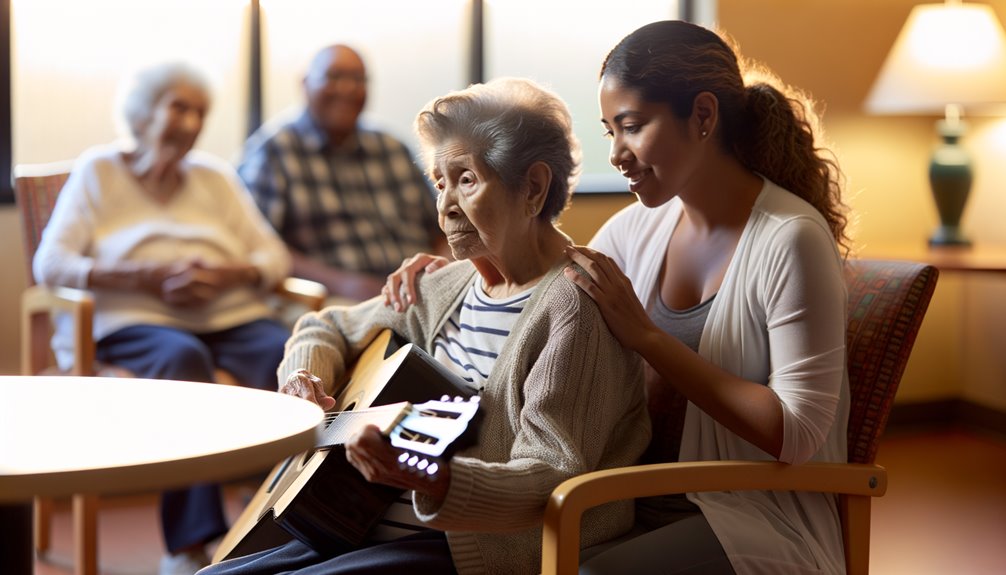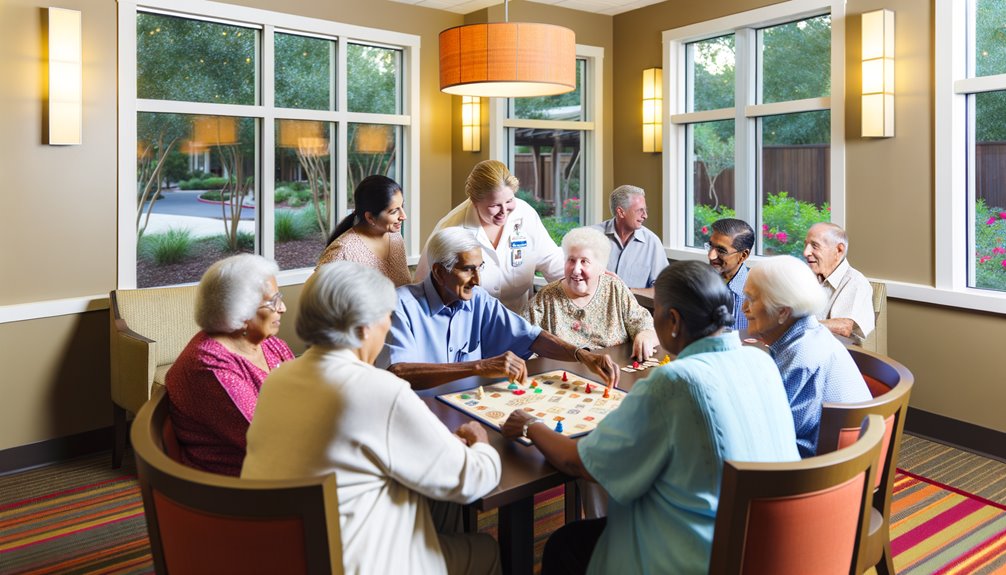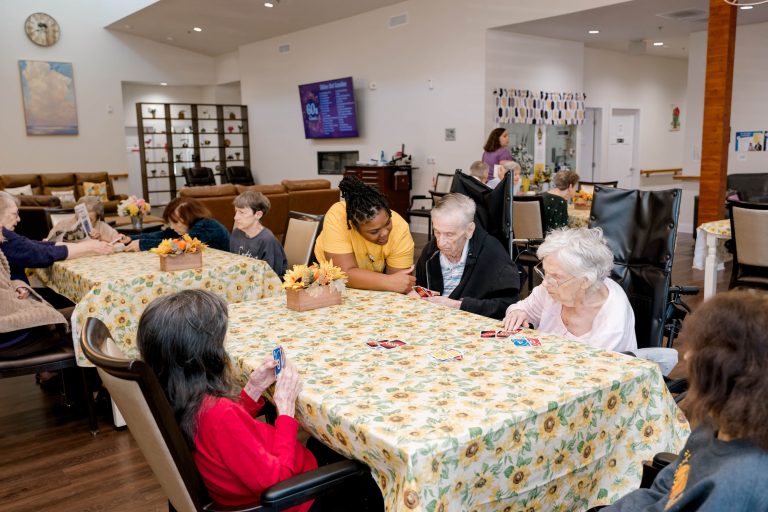How Memory Care Activities Can Improve Quality of Life for Residents
Engaging in memory care activities can notably improve your quality of life. Music therapy, for instance, leverages emotional and cognitive connections to enhance well-being, helping you reconnect with your past through familiar songs and improving memory recall and cognitive function. Arts and crafts, like painting and adult coloring books, foster cognitive connections and emotional well-being, while reminiscence and sensory stimulation activities trigger positive memories and emotions. These tailored activities reduce anxiety and depression, and by continuing to explore these methods, you'll discover even more ways to enrich your life.
Key Takeaways
- Physical Activities: Regular exercise, such as walking, swimming, or cycling, improves cardiovascular health, reduces the risk of diseases, and enhances overall well-being.
- Cognitive Stimulation: Arts and crafts like painting, drawing, and knitting improve fine motor skills, hand-eye coordination, and memory preservation, fostering cognitive connections and emotional well-being.
- Therapeutic Expression: Activities like adult coloring books, scrapbooking, and bead jewelry making provide a sense of accomplishment and therapeutic benefits, enhancing quality of life through creative expression.
- Social Engagement: Participating in group activities such as puzzles, memory games, and community outings reduces anxiety and depression, fostering social bonds and a sense of purpose[BACKGROUND].
- Sensory and Emotional Stimulation: Reminiscence activities engaging all five senses, including music therapy, trigger positive memories and emotions, improving mood and concentration[BACKGROUND].
The Benefits of Physical Activities for Seniors

When it comes to maintaining the health and well-being of seniors, especially those in memory care, incorporating physical activities is essential. These activities not only benefit the body but also have a significant impact on mental and cognitive health. Regular physical activity, such as walking or biking, can improve cardiovascular health and reduce the risk of heart disease. Strength training helps increase muscle strength and flexibility, making daily activities easier and promoting independence.
Balance exercises, like single-leg balance and tree pose, are vital for preventing falls and improving stability. Activities like yoga and tai chi lower stress and anxiety levels, while dancing and swimming boost mood and cognitive function. Physical activity also enhances sleep quality and overall well-being, contributing to a better quality of life for seniors in memory care. By engaging in these activities, you can help seniors maintain their physical and mental health. Moreover, programs designed to promote social interaction and mental stimulation can further enrich the lifestyle of residents in memory care settings.
Cognitive Stimulation Through Arts and Crafts
Engaging in arts and crafts is a powerful way to provide cognitive stimulation for seniors in memory care, as it taps into their creative potential and nurtures their mental well-being. Through activities like painting, drawing, and art therapy, you can encourage creative expression and stimulate various brain functions. Simple projects such as adult coloring books, scrapbooking, and bead jewelry making are excellent options, as they are easy to learn and can be completed in a short time, providing a sense of accomplishment.
These crafts improve fine motor skills, hand-eye coordination, and memory preservation. For example, painting by numbers or creating collages can be highly therapeutic, fostering cognitive connections and emotional well-being. By engaging in these arts and crafts, seniors can maintain their cognitive abilities, enjoy social interaction, and experience the joy of creating something meaningful. This creative expression can greatly enhance their quality of life and overall well-being. Additionally, programs at Maggie's Place are specifically designed to ensure residents feel valued and well-cared for, further enhancing the benefits of these activities.
The Impact of Music Therapy on Memory Care

Music therapy has a profound impact on memory care, as it leverages the emotional and cognitive connections that music evokes to enhance the well-being of seniors. Through music interventions, you can help residents with dementia reconnect with their past and foster an emotional connection with their caregivers. For instance, programs like "Musical Bridges to Memory" use live music from a patient's youth to trigger memories and encourage interactions such as singing, dancing, and playing instruments together.
This approach not only improves memory recall and cognitive function but also enhances emotional health by stimulating the brain's reward system, releasing "feel-good" chemicals like dopamine and serotonin. It reduces neuropsychiatric symptoms like agitation, anxiety, and depression, promoting a better quality of life and social engagement among residents. Additionally, engaging in music therapy can help mitigate some of the financial burdens of dementia that families and caregivers face.
Reminiscence and Sensory Stimulation Activities
How can reminiscence and sensory stimulation activities enrich the lives of seniors with dementia? These activities are designed to engage all five senses, triggering positive memories and emotions. By using everyday objects, familiar foods, music, and fragrances, you can create powerful memory triggers. For instance, a gentle hand massage can stimulate the sense of touch, providing comfort and connection. Sensory engagement through sight, such as looking at family photos, can evoke happy memories. Smells like freshly baked cookies or the sound of favorite music can also bring back pleasant recollections. These activities help seniors feel more relaxed, improve their mood, and increase their levels of concentration and cognitive function, making their daily lives more enjoyable and fulfilling. Importantly, curated care at facilities like Sage Oak of Denton enhances the effectiveness of these activities by tailoring them to the unique preferences and needs of each resident.
Promoting Socialization and Reducing Isolation

Promoting socialization is essential for seniors with dementia, as it helps combat the isolation and loneliness that often accompany the condition. Engaging in group games and activities can greatly enhance their quality of life. For instance, participating in group games like puzzles, brain teasers, and memory games not only stimulates cognitive function but also provides a social outlet and a sense of accomplishment.
Community outings are another effective way to promote socialization. Organizing trips to familiar places, such as old-fashioned general stores or ice cream shops, can evoke good memories and create a sense of comfort and connection. These activities help residents feel valued and supported, reducing anxiety and depression while fostering a stronger sense of community and social bonds. Additionally, Caring Stars Award recipients often provide tailored activities that specifically address the needs of residents, enhancing their engagement and overall well-being.
Tailoring Activities to Individual Interests and Abilities
Tailoring activities to individual interests and abilities is essential for guaranteeing that seniors with dementia remain engaged and fulfilled. By adopting a personalized programming approach, you can create activities that resonate with each person's unique background, experiences, and preferences. This adaptive engagement helps in maintaining their sense of purpose, dignity, and autonomy.
For instance, if a resident has a fondness for music, incorporate music therapy or reminiscence sessions that feature their favorite tunes. If they were avid gardeners, provide gardening activities that are modified to their current physical abilities. This tailored approach guarantees that each activity is meaningful and enjoyable, reducing frustration and enhancing their overall quality of life. By knowing the patient's background and adapting activities accordingly, you can create a supportive and engaging environment that fosters continuous participation and joy. Additionally, providing a secure environment with memory care features further enhances residents' comfort and engagement.




